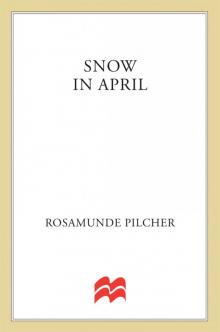- Home
- Rosamunde Pilcher
The Day of the Storm Page 2
The Day of the Storm Read online
Page 2
I could imagine Maggie’s mother. I said, resorting to the comfort of clichés, because I couldn’t think of anything else to say, “Oh, well, it takes all sorts,” and at that moment we heard John’s key in the lock and after that we did not bring up the subject of mothers and families again.
* * *
It was a day like any other day, but it had a bonus attached to it. Last Thursday I had worked late with Stephen, trying to complete the last of the January stocktaking, and in return he had given me this morning off so that I had until lunchtime to my own devices. I filled it in cleaning the flat (which took, at most, no more than half an hour), doing some shopping and taking a bundle of clothes to the launderette. By eleven thirty all this domesticity was completed so I put on my coat and set off, in a leisurely way, for work, intending to walk some of the way, and maybe stand myself an early lunch before getting to the shop.
It was one of those cold, dark, damp days when it never really gets light. I walked, through this gloom, up into the New Kings Road, and headed west. Here, every other shop seems to sell either antiques or second-hand beds or picture frames, and I thought I knew them all, but all at once I found myself outside a shop which I had not noticed before. The outside was painted white, the windows framed in black, and there was a red and white awning pulled out as protection against the imminent drizzle.
I looked up to see what the shop was called and read the name TRISTRAM NOLAN picked out in neat black Roman capitals over the door. This door was flanked by windows filled with delectable odds and ends and I paused to inspect their contents, standing on the pavement bathed in brightness from the many lights which burned within. Most of the furniture was Victorian, re-upholstered and restored and polished. A buttoned sofa with a wide lap and curly legs, a sewing box, a small picture of lap dogs on a velvet cushion.
I looked beyond the windows and into the shop itself, and it was then that I saw the cherrywood chairs. They were a pair, balloon backed, with curved legs and seats embroidered with roses.
I craved them. Just like that. I could picture them in my flat, and I wanted them desperately. For a moment I hesitated. This was no junk shop and the price might well be more than I could afford. But after all, no harm could be done by asking. Before I could lose my nerve, I opened the door and went in.
The shop was empty, but the door opening and closing had rung a bell, and presently there was the sound of someone coming down the stairs, the woollen curtain that hung over the door at the back of the shop was drawn aside and a man came into view.
I suppose I had expected someone elderly and formally attired, in keeping with the ambience of the shop and its contents, but this man’s appearance rocked all my vague, preconceived notions. For he was young, tall and long-legged, dressed in jeans—faded to a soft blue and clinging like a second skin—and a blue denim jacket, equally old and faded, with the sleeves turned back in a businesslike way to reveal the checked cuffs of the shirt he wore beneath it. A cotton handkerchief was knotted at his neck and on his feet he wore soft moccasins, much decorated and fringed.
That winter the most unlikely people were drifting around London dressed as cowboys, but somehow this one looked real, and his worn clothes appeared as genuine as he was. We stood and looked at each other, and then he smiled and for some reason this took me unawares. I don’t like being taken unawares, and I said “Good morning” with a certain coolness.
He dropped the curtain behind him and came forward, soft footed. “Can I help you?”
He may have looked like a genuine, dyed-in-the-wool American, but the moment he opened his mouth it was clear that he was no such thing. For some reason this annoyed me. The life I had led with my mother had left me with a thick streak of cynicism about men in general, and phoneys in particular, and this young man, I decided then and there, was a phoney.
“I … I was going to ask about these little chairs. The balloon-back ones.”
“Oh, yes.” He came forward to lay his hand on the back of one. The hand was long and shapely, with spade-tipped fingers, the skin very brown. “There’s just the pair of them.”
I stared at the chairs, trying to ignore his presence.
“I wondered how much they were.”
He squatted beside me to search for a price ticket and I saw his hair fell thick and straight to his collar, very dark and lustrous.
“You’re in luck,” he told me. “They’re going very cheap because the leg of one has been broken and then not very professionally repaired.” He straightened up suddenly, surprising me by his height. His eyes were slightly tip-tilted, and a very dark brown, with an expression in them that I found disconcerting. He made me uncomfortable and my antipathy for him began to turn to dislike. “Fifteen pounds for the pair,” he said. “But if you’d like to wait and pay a little more, I can get the leg reinforced, and perhaps a small veneer put over the joint. That would make it stronger and it would look better too.”
“Isn’t it all right now?”
“It would be all right for you,” said the young man, “… but if you had a large fat man for dinner, he’d probably end up on his backside.”
There was a pause while I regarded him—I hoped coldly. His eyes were brimming, with a malicious amusement which I had no intention of sharing. I did not appreciate the suggestion that the only men who would ever come and have dinner with me would necessarily be large and fat.
I said at last, “How much would it cost me to have the leg repaired?”
“Say five pounds. That means you get the chairs for a tenner each.”
I worked this out, and decided that I could just afford them.
“I’ll take them.”
“Good,” said the young man and put his fists on his hips and smiled amiably, as though this were the end of the transaction.
I decided he was utterly inefficient. “Do you want me to pay for them now, or to leave a deposit…?”
“No, that doesn’t matter. You can pay for them when you collect them.”
“Well, when will they be ready?”
“In about a week.”
“Don’t you want my name?”
“Not unless you want to give it to me.”
“What happens if I never come back?”
“Then I expect they’ll be sold to someone else.”
“I don’t want to lose them.”
“You won’t,” said the young man.
I frowned, angry with him, but he only smiled and went to the door to open it for me. Cold air poured in, and outside the drizzle had started and the street looked dark as night.
He said, “Goodbye,” and I managed a frosty smile of thanks and went past him, out into the gloom, and as I did so I heard the bell ring as he shut the door behind me.
The day was, all at once, unspeakable. My pleasure in buying the chairs had been wrecked by the irritation which the young man had generated. I did not usually take instant dislikes to people and I was annoyed not only with him, but with myself, for being so vulnerable. I was still brooding on this when I walked down Walton Street and let myself into Stephen Forbes’s bookshop. Even the comfort of being indoors and the pleasant smell of new paper and printers’ ink did nothing to dispel my wretched mood.
The shop was on three levels, with new books on the ground floor, second-hand books and old prints upstairs, and Stephen’s office in the basement. I saw that Jennifer, the second girl, was busy with a customer, and the only other person visible was an old lady in a tweed cape engrossed in the Gardening section, so I headed for the little cloakroom, unbuttoning my coat as I went, but then I heard Stephen’s heavy, unmistakeable footsteps coming up from downstairs, and for some reason I stopped to wait for him. The next moment he appeared, tall, stooping and spectacled, with his usual expression of vague benevolence. He wore dark suits that always managed to appear as though in need of a good press, and already, at this early hour, the knot of his tie had begun to slip down, revealing the top button of his shirt.
�
�Rebecca,” he said.
“Yes, I’m here…”
“I’m glad I’ve caught you.” He came to my side speaking low-voiced, so as not to disturb the customers. “There’s a letter for you downstairs; it’s been forwarded on from your old flat. You’d better nip down and collect it.”
I frowned. “A letter?”
“Yes. Airmail. Lots of foreign stamps. It has, for some reason, an air of urgency about it.”
My irritation, along with all thoughts of new chairs, was lost in a sudden apprehension.
“Is it from my mother?”
“I don’t know. Why don’t you go and find out?”
So I went down the steep, uncarpeted stairs to the basement, lit, on this dark day, by long strip-lights let into the ceiling. The office was marvellously untidy—as usual—littered with letters and parcels and files, piles of old books, and cardboard boxes and ashtrays which nobody ever remembered to empty. But the letter was on the middle of Stephen’s blotter and instantly visible.
I picked it up. An airmail envelope, Spanish stamps, an Ibizan postmark. But the writing was unfamiliar, pointed and spiky, as though a very fine pen had been used. It had been sent to the old flat, but this address had been crossed out and the address of the bookshop substituted in large, girlish, handwriting. I wondered how long the letter had lain on the table by the front door, before one of the girls realized that it was there and had taken the trouble to forward it on to me.
I sat down in Stephen’s chair and slit the envelope. Inside, two pages of fine airmail paper, and the date at the head was the third of January. Very nearly a month ago. My mind sounded a note of alarm and, suddenly frightened, I began to read.
Dear Rebecca,
I hope you do not mind me calling you by your Christian name, but your mother has spoken to me of you a great deal. I am writing because your mother is very ill. She has been unwell for some time and I wished to write to you before but she would not let me.
Now, however, I am taking matters into my own hands, and with the doctor’s approval I am letting you know that I think you should come out to see her.
If you can do this, perhaps you will cable me the number of your aeroplane flight so that I can be at the airport to meet you.
I know that you are working and it may not be easy to make this trip, but I would advise you to waste no time. I am afraid that you will find your mother very changed, but her spirit is still high.
With good wishes.
Sincerely,
Otto Pedersen.
I sat in unbelief, and stared at the letter. The formal words told me nothing and everything. My mother was very ill, perhaps dying. A month ago I had been asked to waste no time but to go to her. Now it was a month later, and I had only just got the letter and perhaps she was already dead—and I had never gone. What would he think of me, this Otto Pedersen whom I had never seen, whose name, even, I had not known until this moment?
2
I read the letter again, and then again, the flimsy pages rustling in my hands. I was still there, sitting at his desk, when Stephen finally came downstairs to find me.
I turned to look up at him over my shoulder. He saw my face and said, “What is it?”
I tried to tell him, but could not. Instead I thrust the letter at him, and while he took it, and read it, I sat with my elbows on his desk, biting my thumbnails, bitter and angry, and fighting a terrible anxiety.
He was soon finished reading. He tossed the letter down on the desk between us, and said, “Did you know she was ill?”
I shook my head.
“When did you last hear from her?”
“Four, five months ago. She never wrote letters.” I looked up at him and said, furiously, choked by the great lump in my throat, “That was nearly a month ago. That letter’s been lying in the flat, and nobody bothered to send it to me. She may be dead by now and I never went, and she’ll think I simply didn’t care!”
“If she had died,” said Stephen, “then we’d have surely heard. Now, don’t cry, there isn’t time for that. What we have to do is get you out to Ibiza with all convenient speed, and let—” he glanced down at the letter again—“Mr Pedersen know you’re arriving. Nothing else matters.”
I said, “I can’t go,” and my mouth began to grow square and my lower lip tremble as though I were a ten-year-old.
“Why can’t you go?”
“Because I haven’t got enough money for the fare.”
“Oh, my dear child, let me worry about that…”
“But I can’t let you…”
“Yes, you can, and if you get all stiff-necked about it then you can pay me back over the next five years and I’ll charge you interest, if it’ll make you feel happier, and now for God’s sake don’t let’s mention it again…” He was already reaching for the directory, behaving in an altogether efficient and un-Stephen-like fashion. “Have you got a passport? And nobody’s going to clamp down on you for smallpox injections or anything tiresome like that. Hallo? British Airways? I want to make a reservation on the first plane to Ibiza.” He smiled down at me, still fighting tears and temper, but already feeling a little better. There is nothing like having a large and kindly man to take over in times of emotional stress. He picked up a pencil and drew a sheet of paper towards him and began to make notes. “Yes. When? Fine. Can we have a reservation, please? Miss Rebecca Bayliss. And what time does it get to Ibiza? And the flight number? Thank you so much. Thank you. Yes, I’ll get her to the airport myself.”
He put down the receiver and surveyed, with some satisfaction, the illegible squiggles his pencil had made.
“That’s it, then. You fly tomorrow morning, change planes at Palma, get to Ibiza about half-past-seven. I’ll drive you to the airport. No, don’t start arguing again, I wouldn’t feel happy unless I saw you actually walk on to the aeroplane. And now we’ll cable Mr Otto Pedersen—” he picked up the letter again—“at the Villa Margareta, Santa Catarina, and let him know that you’re coming.” He smiled down at me with such cheerful reassurance that I was suddenly filled with hope.
I said, “I can’t ever thank you…”
“I don’t ever want you to,” said Stephen. “It’s the least I can do.”
* * *
I flew the next day, in a plane half-filled with hopeful winter holiday tourists. They even carried straw hats against an improbably blazing sun, and their faces, as we stepped out into a steady drizzle at Palma, were disappointed but resolutely cheerful, as though, for certain, tomorrow would be better.
The rain never ceased, all the four hours I waited in the transit lounge, and the flight out of Palma was bumpy with thick, wet clouds. But as we rose above them and headed out across the sea, the weather brightened. The clouds thinned and broke, disclosing an evening sky of robin’s egg blue, and far below the crumpled sea was streaked with the pink light of the setting sun.
It was dark when we landed. Dark and damp. Coming down the gangway beneath a sky full of bright southern stars, there was only the smell of petrol, but as I walked across the puddled tarmac towards the lights of the terminal building I felt the soft wind in my face. It was warm and smelt of pines, and was evocative of every summer holiday I had ever spent abroad.
At this quiet time of the year the plane had not been full. It did not take long to get through Customs and Immigration, and—my passport stamped—I picked up my suitcase and walked into the Arrivals Lounge.
There were the usual small groups of waiting people standing about or sitting hunched apathetically on the long plastic banquettes. I stopped and looked about me, waiting to be identified, but could see nobody who looked in the least like a Swedish writer come to meet me. And then a man turned from buying a newspaper at the bookstall. Across the room our eyes met, and he folded the newspaper and began to walk towards me, pushing his paper into his jacket pocket as though it were no longer of any use to him. He was tall and thin, with hair that was either blond or white—it was impossible to tell in the
bright, impersonal electric light. Before he was half way across the polished floor I smiled tentatively, and as he approached he said my name, “Rebecca?” with a question mark at the end of it, still not entirely certain that it was I.
“Yes.”
“I’m Otto Pedersen.” We shook hands and he gave a formal little bow as he did so. His hair, I saw then, was pale blond, turning grey, and his face was deeply tanned, thin and bony, the skin dry and finely wrinkled from long exposure to the sun. His eyes were very pale, and more grey than blue. He wore a black polo-necked sweater and a light oatmeal-coloured suit with pleated pockets, like a safari shirt, and a belt which hung loose, the buckle swinging. He smelt of aftershave and looked as clean as if he had been bleached.
Having found each other, it was suddenly difficult to find anything to say. All at once we were both overwhelmed by the circumstances of our meeting and I realized that he was as unsure of himself as I. But he was also urbane and polite, and dealt with this by taking my suitcase from me and asking if this was all my luggage.
“Yes, that’s all.”
“Then let us go to the car. If you like to wait at the door, I will fetch it and save you the walk…”
“I’ll come with you.”
“It’s only across the road, in the car park.”
So we went out together, into the darkness again. He led me to the half empty car park. Here, he stopped by a big black Mercedes, unlocked it, and tossed my case on to the back seat. Then he held the door open so that I could get in before coming around to the front of the car to settle himself beside me.
“I hope you had a good journey,” he said, politely, as we left the terminal behind us and headed out into the road.
“It was a little bumpy in Palma. I had to wait four hours.”
“Yes. There are no direct flights at this time of the year.”
I swallowed. “I must explain about not answering your letter. I’ve moved flats, and I didn’t get it till yesterday morning. It wasn’t forwarded to me, you see. It was so good of you to write, and you must have wondered why I never replied.”

 Wild Mountain Thyme
Wild Mountain Thyme Sleeping Tiger
Sleeping Tiger Flowers in the Rain & Other Stories
Flowers in the Rain & Other Stories September
September The Blue Bedroom: & Other Stories
The Blue Bedroom: & Other Stories The Carousel
The Carousel The End of Summer
The End of Summer Snow in April
Snow in April The Shell Seekers
The Shell Seekers Under Gemini
Under Gemini The Empty House
The Empty House The Day of the Storm
The Day of the Storm Another View
Another View Voices in the Summer
Voices in the Summer The World of Rosamunde Pilcher
The World of Rosamunde Pilcher Voices In Summer
Voices In Summer Blue Bedroom and Other Stories
Blue Bedroom and Other Stories